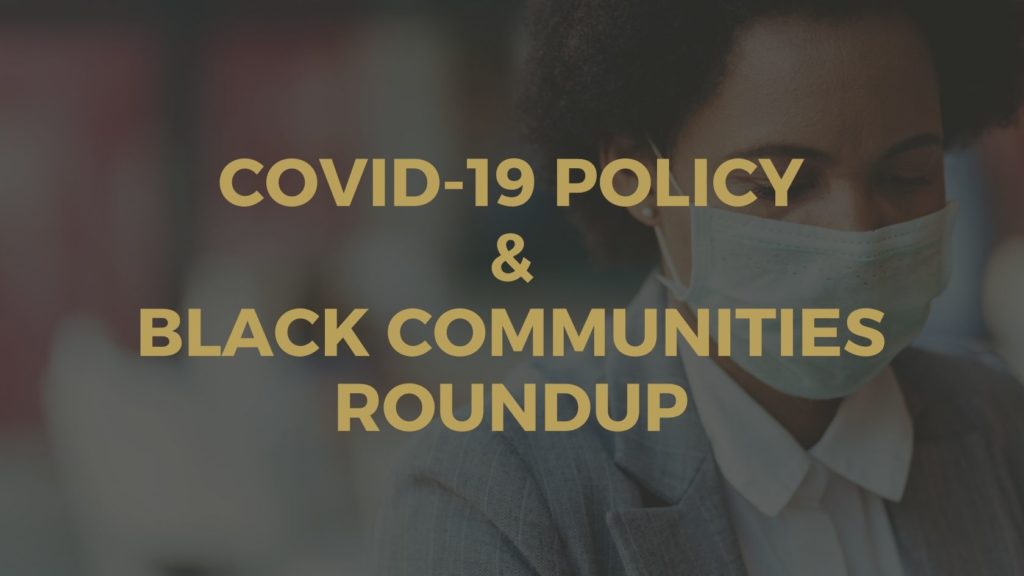
August 5 COVID-19 Policy & Black Communities Roundup
Congress and Administration Continue to Negotiate Coronavirus Relief
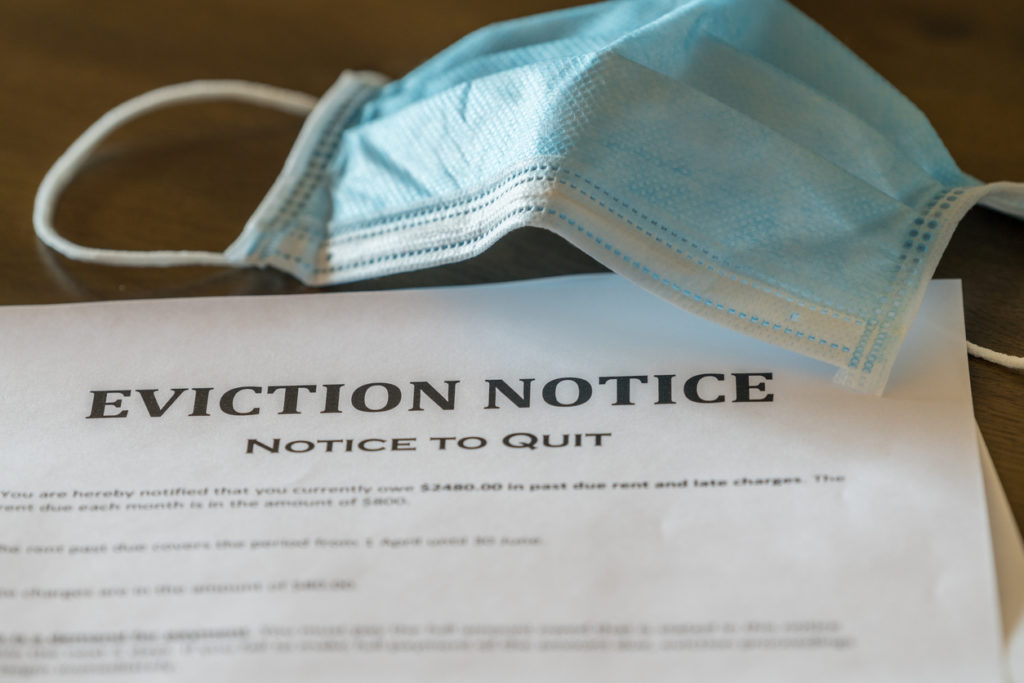
Democrats and the Trump Administration continued their negotiations in the wake of an economic crisis fueled by the July 31 expiration the $600 weekly federal unemployment benefit enjoyed by millions of Americans, the July 24 expiration of the federal moratorium on evictions, and new spikes in unemployment claims. As a result, the nation faces the threat of an impending wave of evictions, food insecurity, and bankruptcies in the midst of the pandemic.
Democrats and the Trump Administration met yesterday (House Speaker Pelosi, Senate Democratic Leader Schumer, Treasury Secretary Mnuchin, and White House Chief of Staff Meadows), and seem to be moving toward agreement on small business assistance and stimulus checks. Differences remain on the $600 unemployment insurance benefit, rent and food assistance, and funding for state and local governments. When the group reaches an agreement, Senate Majority Leader Mitch McConnell has said he is “prepared to support” it.
The Republican Senate $1.1 trillion stimulus proposal released last week was criticized by many groups for insufficiently addressing the needs of African Americans. The Center on Budget and Policy Priorities wrote that the Senate’s plan does not adequately address the hardship faced by Black and Latino populations and therefore fails to prevent “inequities from becoming even more acute in the months ahead.” The Economic Policy Institute claimed the Senate Republican bill would, if passed, exacerbate already deep racial and ethnic inequalities and also criticized the bill for failing to provide aid to local governments. Noting that 47% of workers receiving unemployment insurance are people of color, the National Employment Law Project expressed outrage over the Senate’s bill doing away with federal unemployment benefits. The Center for Law and Social Policy (CLASP) warned that the failures of the Senate Republican bill “will continue to devastate essential workers, communities of color, families with low incomes, young people, and immigrant families and their children.”
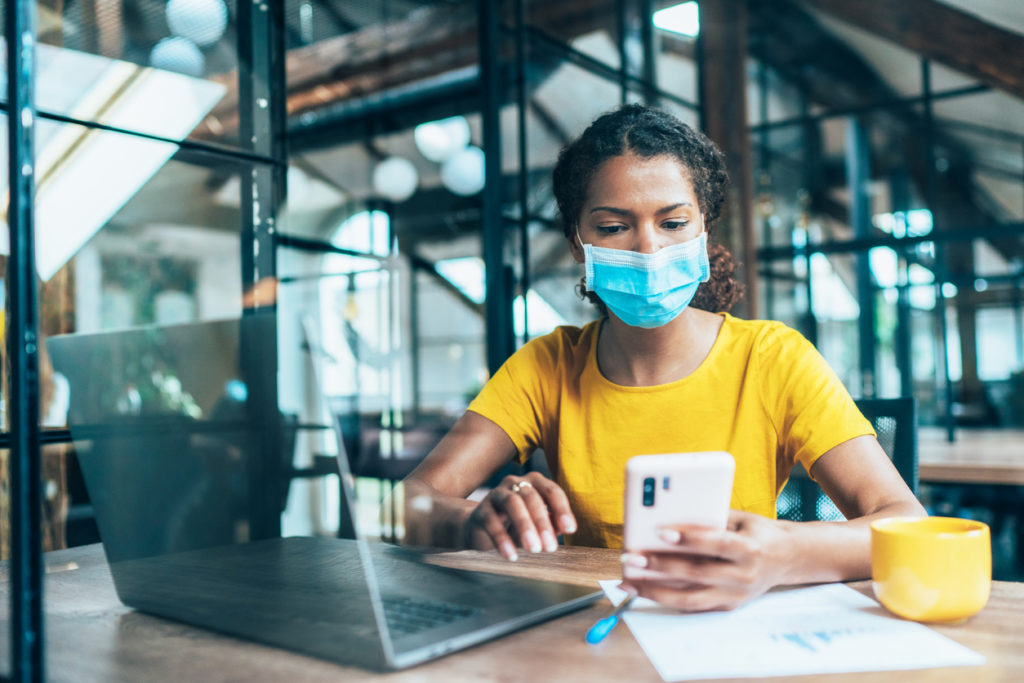
New Joint Center Report: Prioritize Black Communities in Pandemic Relief
As congressional Democrats and the White House continued their negotiations, yesterday the Joint Center released a report entitled Pandemic Relief Priorities for Black Communities.
The report urges Congress and the Administration to ensure the next legislative package addresses the pandemic’s disproportionate harm to Black communities in unemployment, lost income, business closures, and education. Federal policymakers should agree to a stimulus plan that:
- Provides Financial Support for Black Workers by extending the $600 federal unemployment insurance and the Earned Income Tax Credit, increasing SNAP benefits, providing rental assistance, and providing fiscal relief to state and local governments;
- Sustains Black Businesses by reforming the Paycheck Protection Program (PPP) forgiveness process, providing significant funding for CDFIs and Minority Depository Institutions (MDIs), and strengthening the Minority Business Development Agency;
- Expands Internet Access Among Black Households by providing a $50 a month emergency broadband subsidy to households, and allocating $4 billion for laptops, Wi-Fi hotspots, and other equipment that can be used at home by students; and
- Protects Our Democracy by allocating to states at least $3.6 billion for safe and accessible elections, and requiring that states provide online and same day voter registration opportunities, accessible vote-by-mail, early in-person voting, and strategies to ensure sufficient staffing and equipment at in-person polling places.
Read the Joint Center’s entire report here.
Other Relief Proposals
In response to the expiration of the federal moratorium that shielded about 12 million renters from eviction, Congressional Democrats proposed legislation to blunt the impact of a looming housing crisis. Introduced by Sen. Kamala Harris (D-CA) and Reps. Ayanna Pressley (D-MA) and Rosa DeLauro (D-CT), the legislation would provide funding for legal representation for renters facing eviction and limit damage to renters’ credit resulting from evictions. The end of federal protections against eviction is projected to have a disproportionate impact on Black and Latino people, who are twice as likely to rent as white people.
With the U.S. Small Business Administration’s Paycheck Protection Program (PPP) loan application deadline set for August 8, last week Senate Republicans proposed allowing some small businesses to borrow PPP funds for a second time. Only borrowers with 300 or fewer employees that can show at least a 50 percent drop in gross receipts in comparison to the previous year’s quarter would be eligible for a second PPP loan.
A separate coronavirus relief program for businesses, the Federal Reserve’s $600 billion “Main Street” lending program, continues to face difficulties in getting funds to the businesses affected by the pandemic, due in part to rules limiting its ability to provide loans to the most troubled businesses, such as a prohibition against lending to insolvent companies.
Of the total $660 billion allocated as PPP Funds, as of August 5, $522.2 billion in loans had been distributed and the average loan size was $102,470. The deadline to apply for a PPP loan is August 8.
Economic Studies & COVID-19
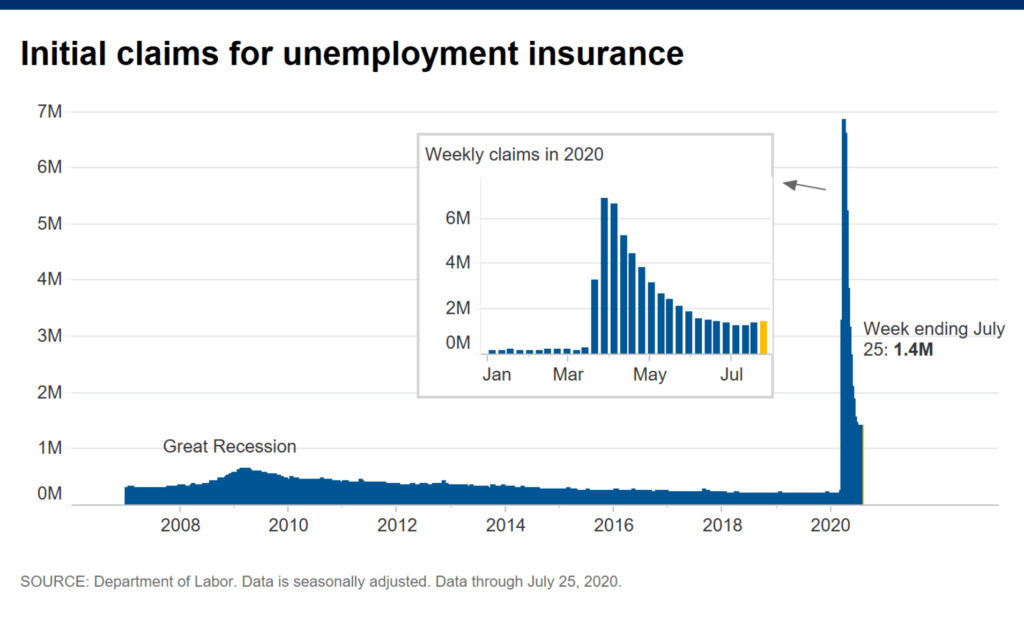
In the same week as the federal supplement to unemployment benefits expired, unemployment claims totaled 1.4 million. This marked the 19th week that claims have remained above one million and exceeded the prior single-week record high of 695,000 claims in 1982.
Although consumer spending rose 5.6% in June, economists are skeptical that spending growth will continue into the next quarter considering the termination of the $600 federal supplement to weekly jobless benefits and spikes in coronavirus cases in parts of the country.
The Urban Institute projects that 2.4 million Black people, 4.9 million white people and 3.7 million Hispanic people would avoid poverty if Congress extends the $600 unemployment benefit, provides a second expanded stimulus check, and expands the Supplemental Nutrition Assistance Program by increasing the minimum benefit and increasing allotments by 15 percent.
A group of unemployment experts led by New America and The Century Foundation launched an interactive unemployment insurance dashboard to help policymakers understand“how unemployment systems are performing; the impact of the CARES Act benefits expiring; the timelines for which benefits are delivered, demographics of benefit recipients, and total benefit payments.”
A Yale report studying the employment impact of the federal government’s additional $600 weekly unemployment payments found “no evidence that recipients of more generous benefits were less likely to return to work.”
In order to sustain the finances of Black, Indigenous, and Latino households during the pandemic, Demos recommends 11 things that Congress should do now, which include issuing cash payments, ensuring access to housing, and protecting Black-owned businesses.
Recommendations made by the Leadership Conference on Civil and Human Rights for the Senate include providing targeted relief for marginalized communities: protecting the most vulnerable working people, ensuring safeguards for homes, and providing shelter to those most in need.
Howard Law School’s Thurgood Marshall Civil Rights Center, Harvard Law School’s Criminal Justice Policy Program, and Law for Black Lives-DC teamed up to publish a new report urging Congress to direct resources to Black communities for testing, Black businesses, and Black-led non-profits.
Without the additional federal unemployment income, up to 130,000 renter households in Louisiana may need up to $432 million in rental assistance in order to avoid evictions, according to a recent report. Noting that Black people are disproportionately affected by anti-homeless legislation and also experience some of the highest rates of homelessness, the Center for American Progress urges Congress to: “maintain a minimum of $11.5 billion in Emergency Solutions Grants to protect people experiencing homelessness during the pandemic; target emergency rental and deposit assistance to currently unhoused people; and to cease the passing and enforcement of anti-homeless legislation for the duration of the pandemic.”
Political Studies & COVID-19
The New York Times explores how COVID-19 is splintering throughout the country and continuing to cause people of color to suffer disproportionately as the U.S. cases reach 4.3 million and has caused more than 150,000 deaths.
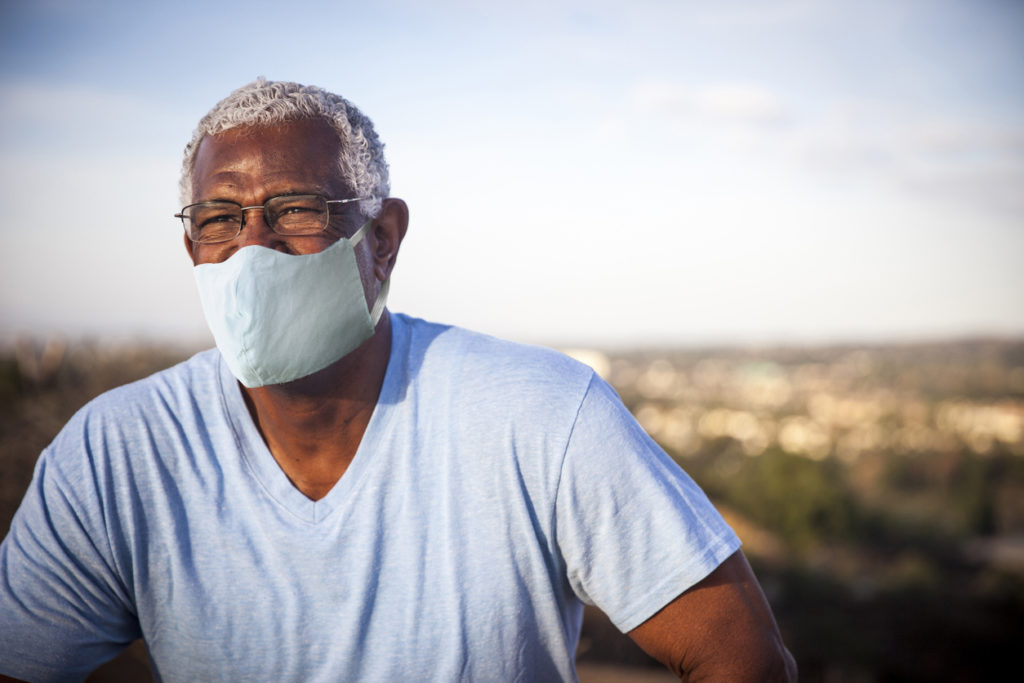
According to the COVID Racial Data Tracker developed by the COVID Tracking Project and the Boston University Center for Antiracist Research, America has lost “at least 31,602 Black lives to COVID-19 to date. Black people account for 22% of COVID-19 deaths where race is known.”
As African Americans face disproportionately high mortality rates, Historically Black Colleges and Universities (HBCUs) are grappling with whether to reopen campuses to students. According to Politico “traditionally underfunded HBCUs could lose even more revenue if fewer students enroll for the fall, and private polling shows that HBCU students are especially feeling the weight of a pandemic that has disproportionately infected, killed and laid off Black Americans.”
The Centers for Disease Control and Prevention (CDC) reportedly botched missions to areas such as Arkansas ,California, Georgia, and North Carolina that have high concentrations of COVID-19 cases among Black people. The CDC was criticized for not collaborating its effort with local pandemic response teams who could have eased fears in Black communities about being tested.
The 15-year-old student known as “Grace” who was sent to a juvenile detention center in Michigan for not completing her online schoolwork during the coronavirus pandemic has been released. The student’s case sparked widespread protests from government officials and community activists who generated a petition that received more than 300,000 signatures.
Movement Building
AARP Government Affairs sent a letter to the Senate Special Committee on Aging asking for demographic data collection and reporting that reflect the stark racial disparities affecting health outcomes for communities of color across the country.
Black Futures Lab created a Black America and the Housing Crisis thread to explore racism in real estate, housing as a public health issue, and how COVID-19 further exposed systemic racism in housing.
Color of Change issued a petition to honor the life and legacy of Congressman John Lewis by urging the Senate to pass the John R. Lewis Voting Rights Act and protect Black voters.
The Leadership Conference for Civil and Human Rights, Lawyers’ Committee for Civil Rights Under Law, NAACP, NAACP Legal Defense and Educational Fund, Inc. (LDF), National Action Network, and several other organizations wrote a letter to Congress urging the passing of the Voting Rights Advancement Act – recently reintroduced as the John Lewis Voting Rights Advancement Act and the election provisions of the HEROES Act to honor the life and legacy of Representative John Lewis.
National Women’s Law Center issued a petition urging the Senate to pass the Child Care Is Essential Act and include at least $50 billion in child care funding in the next COVID-19 stimulus relief legislation “to help the child care industry survive COVID-19.”
Events
Upcoming events include “The Future of Small Business in America” (AARP, August 5); “Responding to the COVID-19 Crisis: Protecting Student Borrowers amid the Pandemic” (Urban Institute; August 5); “Ensuring an Economy That Works for Black Women” (Center for American Progress, August 7); “Preventing Housing Insecurity: COVID-19, Rental Assistance, and Mortgage Relief” (Urban America and New America, August 24).
Last week’s events were held by the CBC, Knight Foundation, National Urban League, NCNW, New America, One Voice MS, The Boston Globe, The Leadership Conference on Civil and Human Rights, and Third Way.
The Joint Center thanks the Annie E. Casey Foundation, the Boulé Foundation, the Democracy Fund, UPS, and the Walmart Foundation for additional support that has allowed us to do some of our COVID-19 and Black Communities work.

